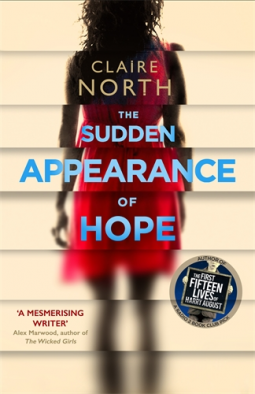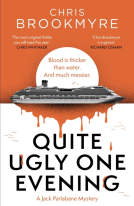
The Sudden Appearance of Hope
by Claire North
This title was previously available on NetGalley and is now archived.
Send NetGalley books directly to your Kindle or Kindle app
1
To read on a Kindle or Kindle app, please add kindle@netgalley.com as an approved email address to receive files in your Amazon account. Click here for step-by-step instructions.
2
Also find your Kindle email address within your Amazon account, and enter it here.
Pub Date 19 May 2016 | Archive Date 13 May 2016
Little, Brown Book Group UK | Orbit
Description
Listen.
All the world forgets me. First my face, then my voice, then the consequences of my deeds.
So listen. Remember me.
My name is Hope Ardern, and you won't know who I am. We've met before - a thousand times. I am the girl the world forgets.
It started when I was sixteen years old. A slow declining, an isolation, one piece at a time.
A father forgetting to drive me to school. A mother setting the table for three, not four. A teacher who forgets to chase my missing homework. A friend who looks straight through me and sees a stranger.
No matter what I do, the words I say, the people I hurt, the crimes I commit - you will never remember who I am.
That makes my life tricky. It also makes me dangerous . . .
This is the tale of a girl no one remembers, and her story will stay with you for ever.
A Note From the Publisher
Requests from UK readers only please.
Marketing Plan
Available Editions
| EDITION | Hardcover |
| ISBN | 9780356504520 |
| PRICE | £16.99 (GBP) |
Links
Average rating from 67 members
Featured Reviews
There have been few novels that I have been more excited to have drop into my Netgalley inbox than this one. The First Fifteen Lives of Harry August was one of my favourite reads of 2014 and I bumped into objects round the home rather than set down Touch - Claire North is one of the most compelling authors who I have come across in recent years. I have been looking forward to this book since I read about it in the afterword to Touch, so it is safe to say that The Sudden Appearance of Hope bore a rather heavy weight of expectation. Although this is not the first time that I have ready a book by a pseudonymous author, it does interest me that Claire North has been picked as the pen name for Catherine Webb, an already established children's author, who also publishes as Kate Griffin. I understand that authors can use different branding (e.g. Iain Banks and Iain M Banks) but this does make me think that in becoming Claire North, the author is trying something new. With The Sudden Appearance of Hope, I was more aware of a personal agenda than I had been in her previous work - this is like Childhood's End meets The Vagenda.
Hope Arden was sixteen when people started to forget her. Her friends started hanging out without her, she was continually being re-introduced by her teachers, and then last of all, her parents forgot her too, clearing out 'the spare room' (Hope's bedroom) and all of Hope's belongings with it. When she heads out the door, her parents bid her a polite goodbye, asking how was it that they'd met her again? In established North style, the timeline chops back and forth while still following an overall structure, so we meet the adult Hope at the height of her skill, making her way in the world as a jewel thief. With a face that is instantly forgotten, she is able to access places that others cannot and since computers are able to record her presence digitally, Hope can fence her loot via the dark web. This changes however when she runs afoul of Perfection.
Having now read three of North's novels, it is easier to identify the themes which preoccupy her (while she in this particular guise of course). A familiar concept in all of her books so far is that of meeting the familiar in the form of a stranger - highly creative variations on Groundhog Day. Harry August, doomed to live his life over and over again, re-established or abandoned friendships and relationships depending on the whim of his current life. Kepler flitted from body to body, regarding old friends through the eyes of a stranger and never being sure who was looking back. Hope's image fades rapidly for the memories of others, so conversations are repeated, friendships form fleetingly and then fizzle and time and again, Hope moves on. Hardened by years of this existence, Hope seems to cope well, to be disciplined in survival but every so often, the cracks appear.
Hope's meaningful connections are few and when one day a woman she had repeatedly befriended commits suicide, Hope is driven to seek vengeance. Believing social pressure, particularly from vicious lifestyle Perfection, to be the impetus, she decides to steal from their main event to cause maximum humiliation. Unfortunately, Perfection turn out to be a far more formidable enemy than Hope could have anticipated, driving her towards the enigmatic online persona Byron, another Perfection foe. As always, North has thoroughly fleshed out the 'rules' of Hope's condition. After roughly sixty seconds of absence, Hope tends to fade from people's memories, meaning that at times she has to get inventive to sustain their attention. When one of the incidents within the book leaves her hospitalised, Hope nearly dies because hospital staff keep going to get food, forgetting and then not coming back for several hours, only for the cycle to repeat again. Another character struggles to recall how Hope takes her tea and remarks that she must get terrible service in restaurants, to which Hope replies that she prefers buffets. Romantic relationships are confined to one night stands (with condoms). Honest work is hard to come by, rental agreements impossible - Hope is doomed to live below the radar.
Still, I found the concept here more difficult to suspend disbelief about than in North's previous two novels, mainly due to the heavy question over what was happening within the brains of those who were doing the forgetting. After spending an extended period of time in Hope's company, Byron heads off for a sneaky brain scan to check no damage has been done. Yet I was still fascinated by how North tapped into a rather primal fear - that of being forgotten by those we love. As a toddler, I used to be left anxious and weeping as one of my comrades at the childminder thought it was hilarious to insist that my mummy was in fact her mummy - a game that was made all the more terrifying because my mother would join in and agree. Even when older, the ultimate fear for so many teenagers is that of social isolation - we can feel the pain as Hope watches her erstwhile friends hanging out without her.
The book's true power however comes from its antagonist - Perfection. This is an all too believable points-based lifestyle app aimed at helping the user find 'the perfect you'. Both compelling and nauseating, Perfection doles out points for desire behaviour, such as visits to the gym and eating recommended food and then deducts points whenever users deviate from its guidelines. Demanding access to people's social media, email, credit card and keystroke information, it is rather unsettlingly close to reality. Enthusiastic converts ask each other, "Do you have Perfection," just as my peer group used to ask, "Are you on Facebook?" ten years ago. A number of scare stories have circled the Internet regarding how much privacy information apps require but Perfection's demands are above and beyond. Its users are given vouchers to shop in 'Perfection-approved' shops, some users have their online grocery orders 'automated' so that they only eat acceptable food. Perfection-sanctioned dating events see men looking for wives 'with eight hundred thousand points or higher'. New levels of points unlock new rewards, up to the point where users are invited for 'treatments'. The 106 club are most fortunate, those who have reached a million points on Perfection - Hope looks aghast at their smiling, vacant faces and determines to tear them down.
I felt in some ways that Hope, whose superpower is how forgettable she is, was rather ironically outshone in her own book by her antagonist. Unlike North's previous work, The Sudden Appearance of Hope did not have as steady a bond between hero and villain. Indeed, with more than one organisation after Hope (Interpol, Perfection, Byron), it was not always clear even to Hope which side she was supposed to be on. Perfection has a feeling of being something about which North is truly passionate and by this she does not mean her fictional nightmare. The app idea creates an algorithm for what the media is forever trying to persuade us that we want - magazines blare out that this makeup or new shampoo is the thing that will make all the difference to our lives. North rages at the superficiality and consumer-driven focus of this - it is not about intelligence or depth of thought, but rather slapping on a shiny grin and getting a better haircut.
It is terrifying though - apps are incredibly addictive and there are so many lifestyle apps out there. Hope lists various pieces of meaningless advice pellets doled about by the 106 club and there is a strange sense that they have been lifted from real life. To cure anxiety, people are advised to eat strawberries. To fight adversity, simply have confidence and believe in yourself. The pressure to gain beauty and success (or at least what our society defines as such) is huge - even the day after I read The Sudden Appearance of Hope, I noticed the articles run by The Independent on what 'successful people' do (what they eat for breakfast, which habits they avoid, which routines they make sacrosanct).
Yet perfection (small p) is not a binary concept - as Hope points out, standards of beauty have fluctuated wildly over the years. In the medieval era, people used to black out their teeth with soot to make it seem as if they were rich enough to have access to sugar. Being tanned was a sign of being poor and having to work the land. Now, it means you're rich enough to have foreign holidays. Even within the past decade or so, fashions on eyebrows have done a volte face (meaning that the sister-in-law of a friend spent £300 getting hers down for a wedding, as she had plucked hers to the point where they no longer grow back in the days where thin ones were in fashion). The app Perfection attempts to regiment an intangible notion - but then, so does our mainstream media.
While Harry August was a detached protagonist, hiding his emotions even from us and Kepler was a chameleon, Hope feels far more like the author. Her views seem to be North's views - but then even North itself is a pseudonym. Again, it was ironic than in a novel featuring a heroine so easy to forget that for the first time, I found it impossible to ignore the book's author. I remain, as always, impressed by Claire North as a writer and The Sudden Appearance is one of the most original reads of 2016.


















